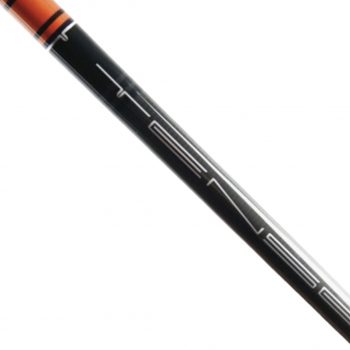Fujikura Ventus Shaft Review
The Fujikura Ventus Black 6 Shaft is a high-performance option for golfers looking for optimized stability, improved feel, and enhanced control. Its exceptional consistency and smooth profile set it apart from other shafts in the market. When perfecting your golfing techniques, the Ventus Black 6 Shaft is in a league of its own. It offers a unique blend of stability and feel, giving you unparalleled control and distance. You’ll experience the precision engineering that sets this shaft apart with every swing. It’s like having a secret weapon, allowing you to optimize your swing and achieve consistent, top-notch performance.
Contents
- Key Features
- Fujikura Ventus Shaft Detailed Review
- Conclusion
- Frequently Asked Questions
- What Is the Specific Torque Rating of the Fujikura Ventus Black 6 Shaft?
- Can the Fujikura Ventus Black 6 Shaft Be Customized for Different Club Lengths?
- Does the Fujikura Ventus Black 6 Shaft Come With a Warranty?
- Are There Any Specific Swing Speeds That the Fujikura Ventus Black 6 Shaft Is Designed For?
- Can the Fujikura Ventus Black 6 Shaft Be Used With Other Driver Brands Besides Taylormade Sim?
- How Does the Fujikura Ventus Shaft Compare?
- Graphite Design Tour AD-IZ
- Fujikura PRO 2.0
- Mitsubishi Tensei CK Pro Orange
Updated February 2024 to update current pricing information.
The newest premium shaft line from Fujikura is the Ventus shaft. Ventus is made using Tour-inspired performance and strenuously tested components using Fujikura’s patented ENSO system. Ventus features the first ever shaft with VeloCore technology and is designed to give players mid-launch and low-spin. This all-new material weave boosts the driver and metal wood clubhead performance by increasing energy transfer and stabilizing off-center hits. Ventus is designed to deliver the tightest dispersion of any Fujikura shaft ever, especially at Tour-level swing speeds. Players swinging their driver above 105 miles per hour who are in the market for a tip-stable shaft without a harsh feel will love the all-new Ventus with Velocore.
Key Features
- VeloCore infuses a full length pitch of 70 Ton carbon fiber with high-modulus 40 Ton carbon fiber to minimize shaft twisting at impact.
- Maximum Carbon Fiber Content is made throughout the shaft and prepreg to ensure the best performance through high-quality material matrixes.
- Straight taper design enhances the energy transfer during the swing by improving loading and player feel.
Fujikura Ventus Shaft Detailed Review
Design and Technology
Fujikura established themselves as the leader in worldwide golf shaft research in design by installing their ENSO system. This 3D motion capture system allows engineers to precisely build shafts that complement elite players’ swings in real time. Using this data, they have designed Ventus to be the ultimate tool for the better player. At high driver swing speeds, the impact generates more energy and the golf shaft must be stable enough to perform optimally. The 70 Ton carbon fiber used in the Ventus shaft is 150% stronger than the next leading T1100g material used by other shaft models. More stability in the shaft means more stability in the clubhead. Ventus is promising better MOI for improved forgiveness, more ball speed from better energy transfer, and an extremely stable tip section without a boardy or harsh feel.
I tested the Ventus shaft in my Ping G400 Max driver at 45 inches in the 70g X-stiff model. During testing, Ventus was an outstanding performer. As a player who believes in the shaft’s influence over strike point and player comfort, I am always happy to see a product that delivers on its promises. I could feel the smoothness of Ventus even though I was playing an extra-stiff shaft. The firm tip section delivered on its promise to make my driver longer and I recorded faster ball speeds with the Ventus than I have with my gamer, the Tensei CK Pro Orange 70TX. Ventus also delivered on increasing dispersion. I saw my miss tolerance rise on poor swings.
Ventus has been engineered for the highest swinging players. Players that need a more stable shaft but do not enjoy the feeling of rigid or harsh extra-stiff offerings will love the feedback and feel of Ventus. Already gaining traction on Tour with some of the game’s best players, Ventus is a must try for any player looking to get the most performance from his or her golf swing.

The Fujikura Ventus Black 6 Shaft is a high-performance option for golfers looking for optimized stability, improved feel, and enhanced control. Its exceptional consistency and smooth profile set it apart from other shafts in the market. When perfecting your golfing techniques, the Ventus Black 6 Shaft is in a league of its own. It offers a unique blend of stability and feel, giving you unparalleled control and distance. You'll experience the precision engineering that sets this shaft apart with every swing. It's like having a secret weapon, allowing you to optimize your swing and achieve consistent, top-notch performance.
- Full-length pitch 70 Ton carbon fiber in Ventus gives golfers more forgiveness with their driver at high speeds.
- The weave of lighter, 40 Ton, fibers retains the smooth feel of softer shafts without sacrificing performance.
- The mid-launch, low-spin design complements modern drivers and delivers more distance and accuracy.
- Players used to a firmer feeling driver shaft may not enjoy the softer feedback of the Fujikura Ventus shaft.
- The $350 price range may be difficult to justify without enough performance benefits over stock offerings.
- Golfers seeking an ultra-low launch and spin combination will likely prefer a higher bend point shaft.

Specs
Ventus is available in four weight categories. The 50-gram versions come in R2 or amateur flex, regular, and stiff flexes. 60-gram options include regular, stiff, and extra-stiff versions. The 70- and 80-gram weights are available in only stiff and extra-stiff models. Each Ventus model is designed with a bend-kick point and delivers a mid-launch, low-spin ball flight. Ventus will be available for testing and purchase at club fitting retailers and online purchase shops.
Conclusion
The Fujikura Ventus offers players a great balance of stability and feel. VeloCore technology helps deliver an ultra-stable shaft for players who do not enjoy the harsh feel of super firm conventional designs. By hiding the strongest fibers throughout the shaft, the golfer is left to swing freely without a sense of losing control of the driver’s head, even at exceptionally high speeds. Ventus is promising more stability on off-center hits and better shot dispersion for elite level players and is a must try for golfers in the market for high performing driver shafts.
Frequently Asked Questions
What Is the Specific Torque Rating of the Fujikura Ventus Black 6 Shaft?
The specific torque rating of the Fujikura Ventus Black 6 Shaft is tailored for different flex options, providing customizable performance. When exploring shaft customization, it’s crucial to consider the specific torque rating for optimal club fitting.
Can the Fujikura Ventus Black 6 Shaft Be Customized for Different Club Lengths?
Yes, the Fujikura Ventus Black 6 Shaft can be customized for different club lengths. It offers various customization options to suit individual preferences and playing styles. The shaft flexibility allows for personalized adjustments.
Does the Fujikura Ventus Black 6 Shaft Come With a Warranty?
Yes, the Fujikura Ventus Black 6 Shaft comes with a limited warranty. Customers have expressed satisfaction with the warranty coverage, but there are some limitations. Overall, the warranty provides peace of mind for many golfers.
Are There Any Specific Swing Speeds That the Fujikura Ventus Black 6 Shaft Is Designed For?
Swing speeds and shaft flexibility are crucial in choosing a golf shaft. The Fujikura Ventus Black 6 Shaft is designed for players with moderate to fast swing speeds, offering stability and control for powerful swings.
Can the Fujikura Ventus Black 6 Shaft Be Used With Other Driver Brands Besides Taylormade Sim?
Absolutely, the Fujikura Ventus Black 6 Shaft is versatile and compatible with various driver brands, not just TaylorMade SIM. Its performance comparison across different drivers showcases its adaptability and consistent performance.
How Does the Fujikura Ventus Shaft Compare?
Graphite Design Tour AD-IZ
The Tour AD-IZ uses aerospace grade materials to deliver a golf shaft that great feel and outstanding performance. The AD-IZ is built with 50 Ton carbon fiber and TORAYCA T1100G Nanoalloy technology to give players a higher launch and mid to low spin rates. Players looking to increase launch, especially in fairway woods from the turf can find an excellent golf shaft in the Tour AD-IZ from Graphite Design. Graphite Designs proprietary Material Stiffness Integration combines layers of material at various angles that deliver exceptional feel without extreme harshness. Players that need control and performance of premium golf shafts but do not want to sacrifice with a boardy feel will fit nicely into the Tour AD-IZ line of shafts.
Fujikura PRO 2.0
The Fujikura PRO 2.0 uses similar design principles as the Ventus shaft to give golfers of all swing speeds more options. Two models combine to give players a standard and Tour Spec model. A variety of weights, flexes, and bend points make the Pro 2.0 shaft lineup great for almost any golfer. The standard model Pro 2.0 makes a great option for drivers and fairway woods especially for slower swinging players. Higher swing speed golfers will love the response and performance associated with the Tour Spec 2.0 offering.
Mitsubishi Tensei CK Pro Orange
The Tensei Pro Orange expands the Tensei line of shafts from Mitsubishi. The Tensei Pro Orange uses a combination of carbon fiber DuPont Kevlar, MR70, low resin content, and tungsten power to deliver a higher balance point, ultra-tip stiff design made for golfers looking for the best performance possible in their driver. Tungsten powder allows Mitsubishi to relocate the balance point higher in the shaft and increase swing speeds of elite players. The Tensei CK Pro Orange shaft is a low-launch, low-spin shaft built for players looking for a high balance point feel for improved timing and better performance off the tee.
As the Founder of Golfers Authority Paul Liberatore Esq. has spent the last 7+ years writing about the best golf equipment or instruction from the top golf instructors in the world. He has been a contributing writer for Sports Illustrated Golf and GolfWRX. After graduating with honors from Purdue University, he realized that he had a passion for the golf business and the law. When he's not practicing law, or creating golf content on YouTube, he can be found on his syndicated Behind the Golf Brand podcast talking with the most prolific leaders in the golf industry.


















